Weekend Reading | The darkest moments of World War II, in what is today known as Ukraine, Natalia Marichin's great-grandparents are a Jewish family Was evacuated to the barn. Now she is rebuilding her life in Montreal. And the descendants of her Jewish family are helping her.
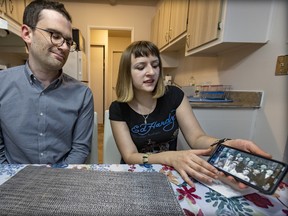
German police officers come to Paris Voda's house in Nizniou At that time, in a Polish village occupied by the Nazis at the time, one pointed his gun at Grigory Parivoda and threatened to shoot unless he showed him where the Jews were hiding.
Parivoda held his middle daughter Katerina in his arms and swore to the officer that no one was hiding.
In fact, Grigoriy and Mariya Palivoda protected three Jews, Bronya Buchwald and her children Lucia and Leon.
The two families are neighbors and the Ukrainian Palivodas are farmers and suppliers of Buchwald's grain and egg business , and their children play together. I was there.
When Nazi Germany invaded the area in 1941, hundreds of Jews were transferred to the city of Stanislawow, 35 kilometers away from Nizniou. Many were killed inside and outside the ghetto — Bronya's husband and his eldest son.
Bronya escaped with her surviving children and returned to Nizuniou to find a shelter. She turned her attention to Palivodas, who gave her family shelter and food. Their kindness and courage almost certainly saved Buchwald.
And now, 80 years later, following Russia's invasion of Ukraine on February 24 and continued conflict, the descendants of the Buchwald family provide support and sanctuary to their families. Provided it saved them.
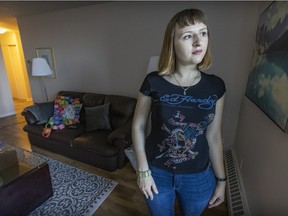
With the help of Grigory's great-grandsons, 24-year-old Natalia Marisin and Mariya Palivoda arrived in Montreal from Ukraine in April. It was in the life of her maternal grandmother, Katerina Parivoda, that her great-grandfather vowed to German officers that day during World War II that she did not hide the Jews.
The circle is closed.
"It was an organic family effort," said Samlangruben, one of Lucia's grandchildren, who quarterbacked the family initiative to take Marisin to Montreal. Told. And he spent countless hours on his side, from organizing her visas and passages to guaranteeing a lease in her westernmost apartment and providing a place to find her job.
"We have an understanding of what these people have done from our family," he said. "Given what was done for us, we were working on our responsibility
" Without her family, we would be here It wouldn't have been, "said the three 35-year-old fathers. "None of us can live a life like us."
Only Mariichyn decided to come to Canada, but the offer was extended to her entire family. "We knew we wouldn't say no to anyone who wanted to come," Rangleben said.
It's not entirely clear how long Buchwald stayed under the roof of Paris Voda — survival details and timelines, if any, were vaguely told only to their descendants — But probably from 1942 to early 1944.
Like many Jews in Europe at the end of World War II, they ended up in refugee camps — probably in Germany and probably in multiples: Lucia Buchwald is Isidor. I met Horn at the DP camp. The couple married in late 1945 and lived in Salzburg for some time before coming to Montreal in 1949. Bronya and Leon arrived a year ago. Bronya lived alone for most of her rest of her life, but she easily got married before she became a widow again. Her children prospered with a family.
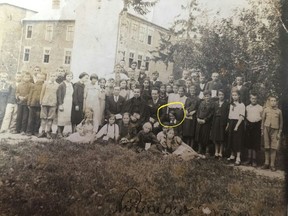
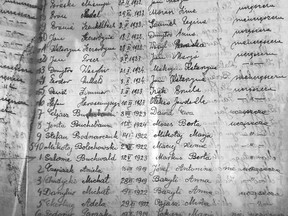
Not uncommon for Holocaust survivors, Lucia Buchwald Horn barely talked about her wartime experience. She died in 2006.
She "never sat down and talked, and we never picked it up," said Ruth Horn, one of her two children. Said.
But Lucia's brother Leontalked about her past. And Langleben, one of Horn's three children, listened. The two were very close — for years they had lunch together on Friday at Snowdon Deli — and Langleben was curious.
"I got a connectivity torch," he said. "Before I was interested, I knew that my grandparents were survivors of the Holocaust."
Many of the survivors' descendants know very little about the lives their grandparents and parents spent before the war. ..They lived — the school my grandmother attended, where her house was.
Langleben decides to travel to Nizuniou. His mother accompanied him on his trip in March 2017. Leon explained and guided the places where his family lived, worked, played, and later hid.
Leon reunited with Paris Voda in the late 1950s and was in regular contact with Marichin's grandmother Katerina until his death in 2018. In Nizniou, Langleben and Horn met members of the Paris Voda family and visited the tombs of Grigory and Mary. They saw a school in the children's village of Buchwald and it is still running. Then I found a picture of Lucia's 1936 school at the age of 13 and a record of the school with her name on it. (She was known as Lucia in Canada, but in Poland her parents called her Shroma. Leon was known as Eliezel.)
They visited a barn with Bronya, Lucia and Leon protected, but their hiding place was still intact. Some are in the back room and some are under the floorboards. Separate hiding places meant that if one was found, the other might not be found. The youngest of the three Paris Voda sisters still live at home with her family.
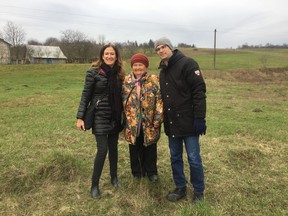
Marichin was a teenager when "her grandmother told me the whole story." She remembered. She said her great-grandparents acted the same way, "because they were devoted people and knew this family well, and probably because they were religious Christians and wanted to save their lives." thinking about.
Still, one night, watching a video of Langleben's hideout sitting in the kitchen of a hilarious Montreal apartment, she said: "What an incredible story."
Langleben and Horn never told her sister that Buchwald was in the rooftop from the youngest daughter of Paris Voda during her visit. I heard how. When they hear the sound from the barn, her mother will say it's a chicken. Palivodas gave Buchwalds clothes worn by field workers so they would blend in.
"Today" Horn thought, "I don't know what motivated them to take such a risk."
Certainly many others did not help the Jews. Certainly, some people worked with the Nazis.Parivoda's house is in the countryside, and the police arriving to search for it means they went twice, saying, "Someone informs them that this family is protecting Jews. It must have been, "Rangle Ben said.
But there were people like Palivodas.
In 1998,Grigoriy and Mariya Palivoda were recognized as justice in the country by Yad Vashem, the Israeli authority on the Holocaust Memorial. .. Extreme personal danger, chose to save the Jews.
February. On the 24th of 2022, Mariichyn saw an explosion and panicked people running down the street on his way to work at the farmers market in the Ukrainian city Ivano-Frankivsk (formerly Stanislawów and formerly Poland). rice field.
She contacted her boss and she said she couldn't get a job, but she didn't receive a mobile phone. When her friend drove her house, they heard Ukrainian President Volodymyr Zelensky on the car radio saying that the war had begun. "I thought I was sleeping and having a nightmare," recalls Mariichyn.
She wanted to volunteer for her war efforts, but she knew she needed to help her family. The farmers market was closed and a significant portion of their income had evaporated. Mariichyn she used to work on a Polish farm — even before the current conflict, there were a million Ukrainians working in Poland — and she was thinking of returning.
After the 2017 visit, Langrenben and Horn were in contact with the two Palivoda through Facebook Messenger and occasional email (with the help of Google Translate). Horn sends Marisin's mother, Miroslava, a message asking them what they are doing, and she about theemergency licensing program that the Canadian government has set up to grant Ukrainians coming to Canada a three-year work permit. I talked to. If Natalia is interested, Miloslava needs to talk to her son Sam.She said her family would help them.
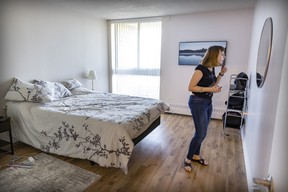
On the conference phone, "discuss and provide the process and paperwork she needs. "Her confidence that we will support her in the process," recalled Langleben.
Initially, she said, "She was a little scared to come to Canada," Marichin, who speaks English. "Of course, I was hesitant and nervous, but I decided to talk to my family and go."
She and Langleben talk daily until they leave Ukraine in mid-March. Did. Air raids meant she was often in her basement. "When we spoke, the stress of the war was definitely in the air," he said.
Her plan was to take a bus to the Polish farm where she used to work. Langleben's family found a lawyer working on behalf of a Ukrainian who wanted to come to Canada, and Maritin made an iris scan and fingerprint appointment for a visa: Langleben to avoid a lineup in Poland Asked to be in Paris: he hired a driver to book a plane and hotel for her and pick her up at the airport.
The visa passed on April 12, and the next day Langleben picked up Marisin at the airport in Montreal and took her to her new apartment. He bought some furniture and furnishings and solicited donations from his friends and the wider community through Facebook. "A lot of people have come out before," he said. At
HomeSense, he found a canvas that referred to iconic Canadian scenes, such as the Novascosia Lighthouse and Lake Alberta surrounded by mountains. He had a refrigerator and a pantry in stock. The following week, before Mariichin began his job as a hotel housekeeper, he took a bus and metro to show the route with her.
Mariichyn sometimes confesses that she doesn't feel more like a person on another continent than "she is a person in another world," but she adjusts. She sometimes has dinner with Langleben's mother and other family members. She has been enrolled in French courses since July. Two months later as a housekeeper, she started working for a catering company. She uses applications such as Viber and WhatsApp to talk to her mother twice a day and send money home on a regular basis.
Mariichyn understands that what her great-grandparents did is noteworthy, but the behavior of the descendants of the Buchwald family, who represent her family, has a profound effect. She found that she was. On the surface, she and Sam Langleben are strangers. But their families are connected by history — and history builds its own bond.
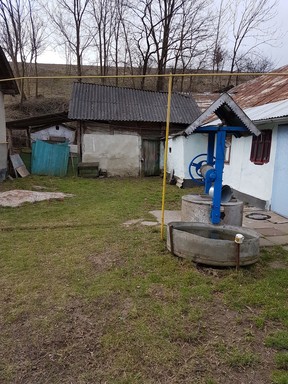
Timeline of the region that is in fierce conflict with Stanislaw Ghetto
During the months following World War I, Stanislaw was a temporary in the People's Republic of Western Ukraine. It was a great capital. Attached as part of the Second Polish Republic. Among its inhabitants were Ukrainians of ethnicities like Palivodas.
Immediately after the start of World War II in September 1939, Soviet troops invaded eastern Poland. This area remained part of the Soviet Socialist Republic of Ukraine until it was occupied by Nazi Germany in June 1941. Ghetto was founded in Stanislawow, where there were more than 40,000 Jews. Most were killed during the Nazi occupation that lasted from 1941 to 1944.
In 1944, with the withdrawal of German troops and the advance of the Red Army into Poland, the city became part of the Soviet Union and was called Stanislav. In 1962 it was renamed Ivano-Frankivsk.
In 1991, at the beginning of the end of the Soviet Union, Ivano-Frankifsk became part of an independent Ukraine.
On February 24, 2022, the day Russia invaded Ukraine, Natalia Maritin, her parents, and Ivanofrankifsk, the hometown of her maternal grandmother, first attacked a Russian missile. I was.
sschwartz @ postmedia. com
-

COVID-19 "Second tragedy" for Holocaust survivors in Montreal
-

"It was a long journey": Hope and tears 305 Ukrainian refugees land in Montreal

Sign up for daily headline news from Montreal Postmedia Network Inc. Click the sign-up button on Gazette
Thank you for registering.
A welcome email will be sent. If you don't see it, check your junk folder.
The next issue of Montreal GazetteHeadlineNews will soon arrive in your inbox.


